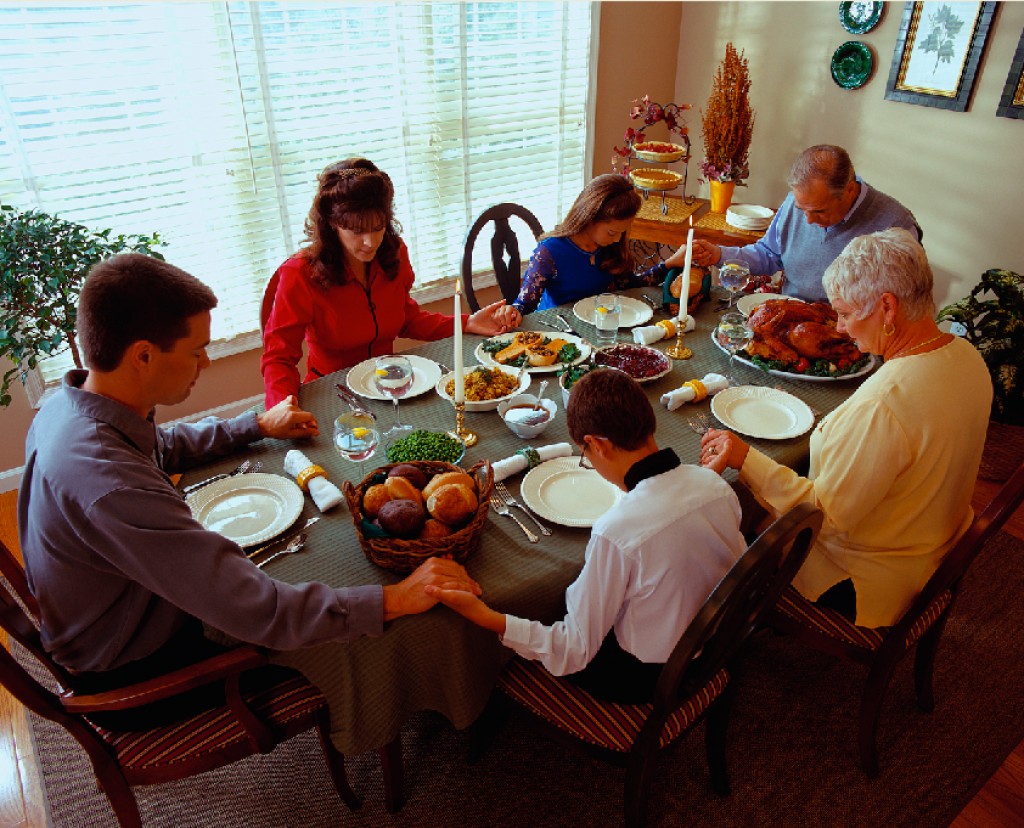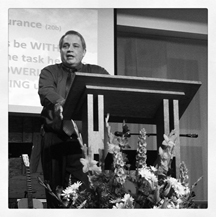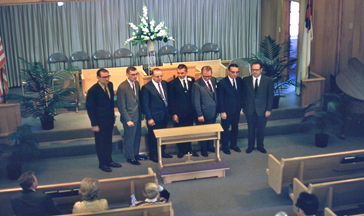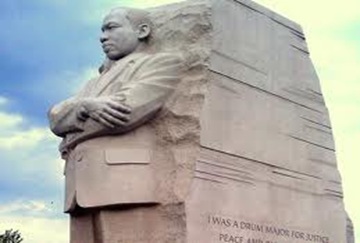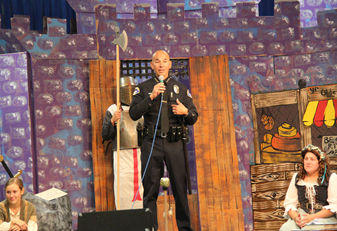May 2014 Newsletter from Donald Shoemaker
“Advancing Christian Faith and Values,
Defending Religious Liberty for All,
Supporting Civility and the Common Good
through Preaching, Teaching, Writing, Activism
and Reasoned Conversations
www.donaldshoemakerministries.com
The Salon Massacre—Guilty Plea Just Ahead?
At the time of this writing (April 30), news outlets report that the accused murderer of eight at Seal Beach’s Salon Meritage on October 12, 2011, will plead guilty very soon. Thus will end the 2½-year delay for justice (at least the trial stage) in the case of Orange County, California’s worst mass killing.
My prayers are now sincerely focused on peace of mind and heart to the community and especially to all the individuals and families affected by this monstrosity. Though “closure” is not an appropriate word, this will be indeed an important milestone and step toward healing.
As Senior Chaplain for the Seal Beach Police Department, my own life was dramatically impacted by this massacre. Please see my writings: “Justice Still Waits” (October, 2013 Newsletter) and “Forgiveness” (September, 2013 Newsletter), available at my Website.
“Prophets are Good for Business”
(Applying Biblical Principles to Work Situations)
Equity and the Film Industry
 “The poor are shunned even by their neighbors, but the rich have many friends.” – Proverbs 14:20
“The poor are shunned even by their neighbors, but the rich have many friends.” – Proverbs 14:20
“Many curry favor with a ruler, and everyone is the friend of one who gives gifts.” – Proverbs 19:6
“Justice” “Fairness” “Equity” – all these are values grounded in the Bible and essential to a good society. It is especially important that governments practice equity—no one stands above another—in legislation and jurisprudence. This is reflected and required in the 14th Amendment, which provides for the equal protection of law.
For states to curry the favor of particular businesses (rather than “business” in general) seems to me to violate the spirit of equity. This is glaringly true when California proposes special tax breaks for the film industry so it won’t run away to other locations.
Sadly, the situation becomes “You did it so now we have to do it too—only bigger!” Other states (44!) offer incentives to lure away film production and so California, it is said, not only has to do catch-up but also needs to get ahead of the game. ***
What raises the “equity” issue is that this is not for all businesses but for particular businesses with friends in high places. Jesus told the story of the heartless judge who said to himself, “Even though I don’t fear God or care about men, yet because this widow keeps bothering me, I will see that she gets justice!” (Luke 18:4-5)
Do tax credits for the film industry benefit the broader commercial life of a state or region (a version of the “trickle down” theory)? Arguments on the commercial value of such credits go either way. This statement comes from an economist with Wells-Fargo:
“It doesn’t improve our labor force. It doesn’t provide us with any fixed assets that are going to improve our competitiveness. … The only thing that keeps bringing folks here is our willingness to continue to give them money.”
Equity and the economy would be better served if California and its cities created a much healthier business climate for all.
Favoritism gives credence to charges of “crony capitalism” and “corporate welfare.”
The Proverbs at the top express a reality of this imperfect world—privilege begets more privilege. The following biblical texts are more prescriptive, directing us away from favoritism for a few and toward equity for all:
“Rich and poor have this in common: The Lord is the Maker of them all.” – Proverbs 22:2
“Do you rulers indeed speak justly? Do you judge people with equity?” – Psalm 58:1
*** The same tendency afflicts government-sponsored gambling. People grow tired of older games (the “fix” isn’t what it used to be), so the games are made more alluring. States engage in “one-upmanship”. The flow of revenue and the news media’s fascination with celebrating the prizes (giving leave to all objectivity) overwhelm the social downsides of gambling.
Religious Liberty Vigilance –
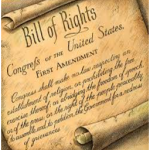 “Congress shall make no law respecting an establishment of religion, or prohibiting the free exercise thereof…”
“Congress shall make no law respecting an establishment of religion, or prohibiting the free exercise thereof…”
– 1st Amendment (Our “First Freedom” in the Bill of Rights)
“To compel a man to furnish contributions of money for the propagation of opinions which he disbelieves is sinful and tyrannical.
– Thomas Jefferson (Virginia Statute for Religious Freedom)
Kathleen Sebelius has left her position as Secretary of Health and Human Services. Whatever her successes or failures, what must not be forgotten 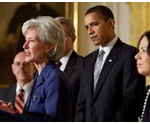 was her January 20, 2012 statement about the “contraception mandate” that would be placed on religious organizations:
was her January 20, 2012 statement about the “contraception mandate” that would be placed on religious organizations:
Nonprofit employers who, based on religious beliefs, do not currently provide contraceptive coverage in their insurance plan, will be provided an additional year, until August 1, 2013, to comply with the new law. Employers wishing to take advantage of the additional year must certify that they qualify for the delayed implementation. This additional year will allow these organizations more time and flexibility to adapt to this new rule.
In other words, if this mandate troubles the religion-formed conscience of a religious organization—good news! We will give you an extra year before you have to compromise your consciences or figure out how to evade the guilt.
Much argument (actually a political firestorm) and some modification have taken place since this statement was issued. But its initial arrogance showed a tone-deaf attitude often found in government toward religious conviction—an attitude that must not be allowed to go without response and even resistance.
Don’s Upcoming Ministries
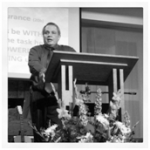 May 3 (8:30) – Men’s fellowship breakfast at Malarkey’s. Lead a panel of Christian men with a law enforcement career.
May 3 (8:30) – Men’s fellowship breakfast at Malarkey’s. Lead a panel of Christian men with a law enforcement career.
May 4 – Speak in Morning Worship Services at Grace Community Church of Seal Beach (8:00, 9:30 and 11:00)
June 3-4 – Meeting of Committee developing Grace Brethren identity statement (Winona Lake, Indiana)
June 17 – Speak at breakfast for the Men’s Fellowship of Pasadena’s Lake Avenue Congregational Church
Message of the Month –
Words from an Older Minister to a Younger Minister
[Note: In January an assignment given at a retreat was to write a message to a young minister, as the Apostle Paul wrote to his young protégé, Timothy. Then, in February, I was privileged to give the “Charge” to a young pastor at his ordination service. Here I draw together edited thoughts from both of these works.]
To my son and co-worker in the faith, whom I deeply love, grace and peace to you from God our Father and The Lord Jesus Christ. I thank my God for you.
I’ve been privileged to have a ministry extending over 45 years. You are one seasoned follower of Christ who will carry on God’s work into the future, as I have been graced by God to do it in the past.
You will not do it my way, nor would I want you to. You may glean from my experience and that of others and then put together your own pathway to follow. The key to remember is that you carefully examine all you think and do, to wisely know what must remain and what is allowed to change.
You are free before God to make your own choices in many of your ministry decisions and to be accountable for these choices, bound by God’s commands that build the fences around what you choose. But don’t forget the value of having a multitude of counselors, especially your church’s leadership.
The authority of Scripture must remain. Yes, there will be strong discussions among godly people over just how the Bible is inspired of God and how this should affect our interpretations, teaching and application. But this core conviction must remain.
Then, the core teachings of Scripture must remain. You can voice this core in many ways. But among the best is found in the words of the ancient “Apostles Creed.” This creed speaks to Christians and to the world of every generation. Notice how it is even expressed through some contemporary music styles. Embrace its words, and see that they remain.
And teach it! You can be clever but don’t try to be cute. Be contemporary without being trendy or faddish. You should teach to touch your generation, but don’t try to remodel what ought to remain. Believe me, it won’t work!
I was born near the end of the Second World War. It was a pivotal time. Generations before seemed stable and traditions continued. Changes that did occur were gradual. All that is over! My generation and the generations that have followed ours are used to rapid change, and now it is more rapid than ever. Many results of this are good; some are not.
You will have to assess new ideas and developments with discernment and care. Don’t reject them out of hand or run toward them unreflectively. For example, communication has exploded in my lifetime and yours. People give and receive information at an astounding level. Not all of it is good! People communicate more than ever before, but I’d be hard pressed to say they communicate better than before. Take what the Bible says about our words, good and bad, and have your speech “seasoned with salt” at all times. Teach others to do the same. Teach them to be “quick to hear, slow to speak.”
Contemporary Christians often lack spiritual “roots”—a value prominent in Scripture. If we don’t know where we came from, we will have a harder time knowing who we are and where we should be going. Also, many don’t value history, so they can’t learn from the traditions and experiences of the past—good ones as well as failures. And they don’t value wisdom gained by generations past, living or dead.
In contrast, the Book of Proverb reflects constantly on the seasoned insights of long lives lived and shared. Live the Proverbs Way. Have great respect for those who have lived longer than you. Value the learning that comes from books, but remember that learning from the lives people have led is more valuable than learning from the books you have read.
You will face challenges that are either new or increased, compared to the challenges of the past. Your culture will be less and less supportive of your faith and message. In the name of “tolerance” it will reject you if you are loyal to the core that must remain. You should expect to “pay the price” at a level I didn’t have to.
Do your best to live in your community and culture productively. Seek the “shalom” of your community, as one of my favorite prophets Jeremiah once said (Jeremiah 29:7). Do your best to make it a better place. Learn to interact with all kinds of people. Seek the common good. When you do have to speak out against something in your culture, do it from the strong position of respect you have earned, as I once told Timothy that leaders of a church must have respect among unbelievers.
Be a good citizen and an effective community leader. Work to make your government good. Don’t try to “Christianize” it—that’s not what biblical influence calls for. But strive to make it good. Remember, you are a community leader whether you think of yourself as one or not. Do justice, love mercy, walk humbly.
And keep strong in your testimony in word and deed. You have a calling to share your faith with others and strengthen your fellow believers to do the same. Teach them how to have reasons for the hope that is within them and how to share these with those who do not know your Lord.
In your personal life, be sure to honor your spouse above all and love her as Christ loves his church. Make sure your place of ministry regards her and your children as persons in their own right, not as extensions of the church. Be sure your family members can maintain reasonable privacy and protect them from any unfair judgments.
Be sure you keep a weekly “sabbatical” and don’t immerse yourself unreasonably (yes, pridefully) into church matters to where they consume you. Don’t think more highly of yourself than you ought to think.
Live backward from how you wish to reflect back upon your life as you reach the end of your journey, so you can say sincerely, “I have fought the fight; I have kept the faith.”
[SUBSCRIPTIONS]
May 2014 Newsletter from Donald Shoemaker



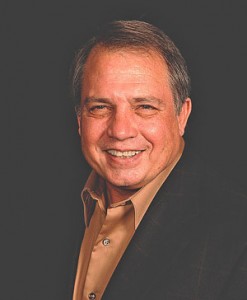



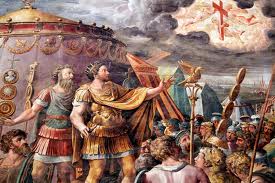

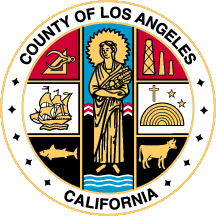
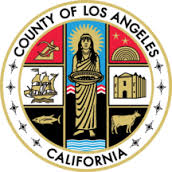
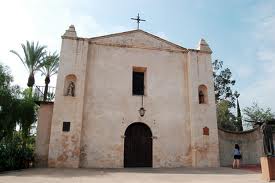


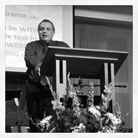




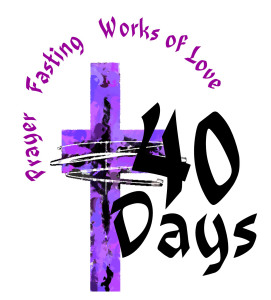 A time many Christians devote to self-examination, confession of sin, sacrificial deeds, special occasions of worship and thanksgiving to God for forgiveness of sin and the power of the cross. All leading up to the Easter climax of the Empty Tomb.
A time many Christians devote to self-examination, confession of sin, sacrificial deeds, special occasions of worship and thanksgiving to God for forgiveness of sin and the power of the cross. All leading up to the Easter climax of the Empty Tomb.
 “A man ought to examine himself before he eats of the bread and drinks of the cup.” (1 Corinthians 11:28 NIV)
“A man ought to examine himself before he eats of the bread and drinks of the cup.” (1 Corinthians 11:28 NIV)





